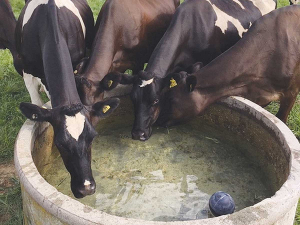Environment Canterbury urges buyers to check wastewater systems on rural properties
Buying or building a rural or semi-rural property? Make sure you know where the wastewater goes, says Environment Canterbury.
 Davey water treatment’s Acqua system has been a good investment for Waikato dairy farmers the van Ras family.
Davey water treatment’s Acqua system has been a good investment for Waikato dairy farmers the van Ras family.
Davey water treatment’s Acqua system has been a good investment for a Waikato dairy farming family.
You can take a cow to water, but can you make it drink?
Unlike horses, the answer is yes, if the experiences of the van Ras family in Waikato are anything to go by.
Waiorongomai Valley Farms lies near State Highway 27, just north of the Tatua Dairy Company. The property of 76ha (66ha effective), carries 215 milkers and 52 followers. It’s mostly grass with 8ha of forage maize.
A few years ago, the family was dealing with poorly children, so tested the water, discovering problems with E-coli and high nitrate, copper and manganese levels. They first addressed the E-coli issue with a UV filter system, while continuing to use a sand-based primary filtration system.
Looking for even better water quality, they trialled an Acqua system offered by Davey water treatment.
Self-contained in a cabinet, the unit only needs a level base, water inlet and outlet connections and an electrical connection.
The process starts by testing the original supply from the bore to design a system that deals with the problem areas.
Claudia Knarston, dairy sales territory manager for the Acqua, says this aspect is important to farmers.
“Unlike off the shelf solutions, we tailor the system to suit individual problems, monitor via ongoing testing and tweak to deal with any changes.”
At the van Ras property, the cabinet houses the treatment system. The water is chlorinated from the bore, passes through a contact vessel, followed by a multi-media filter and a large vessel that contains replaceable media to remove iron and manganese.
Richard van Ras says this gives them “town water quality without the smell of chlorine.”
Also, nitrates are removed from the water by an ion-exchange system that filters it through a bed of nitrate specific resin. This causes nitrate ions to be replaced by harmless chloride ions in the treated water.
Once the resin capacity is exhausted, the system is regenerated using a concentrated brine solution that reverses the process by reinstating chloride ions in the media while flushing the nitrates to waste.
In practical terms, Johan van Ras sees major benefits from the treated water supply.
“Out in the paddocks there are no longer any queues for fresh water. The cows just wander up, drink, then go back to pasture.
“We have also seen a significant drop in cell counts since the system was introduced and believe the fresh water is delivering better efficacy for things like teat sprays and dairy detergents.
“In addition, our yields are up, with the only change being a ready supply of clean water, while the water in the homes is much nicer and we are not seeing any clouding of glasses from the dishwasher.”
A key part of the installation is Halo Premium monitoring of water levels, usage, chlorine and salts levels, with a text message sent to the users’ mobile phones if there are any problems.
Johan van Ras says the system, although costly, gives them peace of mind, ensuring they have clean water on the farm and in the houses.
“We typically treat about 30 cubic metres of water each day on average, with the only consumables being salt and chorine. That costs about $2000 per annum, a small price to pay for top-notch water.”
Coming in at a year-end total at 3088 units, a rise of around 10% over the 2806 total for 2024, the signs are that the New Zealand farm machinery industry is turning the corner after a difficult couple of years.
New Zealand's animal health industry has a new tool addressing a long-standing sustainability issue.
The Government has announced that ACC will be a sponsor of this year's FMG Young Farmer of the Year competition.
As veterinary student numbers grow to help address New Zealand's national workforce shortge, Massey University's School of Veterinary Science is inviting more veterinary practices to partner in training the next generation of vets.
South Island dairy farmers will soon be able to supply organic milk to Fonterra.
Norwood has announced the opening of a new Tasman dealership at Richmond near Nelson next month.

OPINION: Meanwhile, red blooded Northland politician Matua Shane Jones has provided one of the most telling quotes of the year…
OPINION: This old mutt has been around for a few years now and it seems these ‘once in 100-year’ weather…